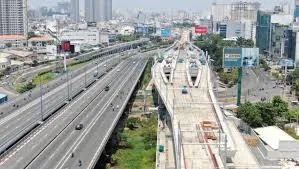
Among its provisions, RES.98 facilitated the integration of public investment with social capital through public-private partnerships (PPPs). To gain insights into the city's struggles in this endeavor, Saigon Investment discussed the matter with Dr. Tran Du Lich, Chairman of the Advisory Council tasked with implementing RES.98.
REPORTER: - Sir, why has there been a decrease in the number of projects participating since the enactment of the PPP Law in 2021 compared to before its implementation?
DR. TRAN DU LICH: - It is indeed true that since the enactment of the PPP Law, we have yet to see a significant increase in PPP investments. There are both subjective and objective factors contributing to this. On the subjective side, many subsequent investment projects have a state capital ratio of less than 50% of the total investment. However, these projects entail high compensation and resettlement costs, which often deter private investors due to the absence of a viable financial plan. Therefore, under RES.98, Ho Chi Minh City will be permitted to increase the state capital ratio in PPP projects to a maximum of 70% of the total investment.
On the objective side, every PPP project involves compensation and resettlement, which can be daunting for private enterprises (DN). This aspect makes such projects less appealing to them. Additionally, historically high interest rates (which only began to decrease this year) coupled with substantial financial costs within the total project have made it challenging for DN to balance cash flow, especially for PPP infrastructure projects. Consequently, passing through these hurdles has proven to be very difficult. In fact, even the North-South Expressway has seen component projects transition from the PPP method to public investment due to DN's inability to formulate a viable financial plan.
- So how does RES.98 help Ho Chi Minh City solve the PPP capital problem?
- RES.98 addresses two groups of issues for Ho Chi Minh City. Firstly, it expands the mechanism of decentralization and delegation of state management to the city. Secondly, it creates a breakthrough mechanism to attract resources, including private investment, allowing the city to leverage all its advantages. Specifically, while the PPP Law restricts private sector participation to only five groups of fields, excluding culture and sports, RES.98 allows Ho Chi Minh City to broaden PPP involvement in these two areas, fostering harmonious development across the economy, culture, society, and sports.
RES.98 also permits the use of BOT (Build-Operate-Transfer) contracts for upgrading existing road infrastructure projects and allows the application of BT (Build-Transfer) contracts funded by the state budget. Furthermore, addressing an important aspect of Ho Chi Minh City's transportation development, RES.98 enables the city to expand its transport connectivity with residential urban areas through TOD (Transit-Oriented Development). Specifically, Ho Chi Minh City is granted authority over land reclamation, urban planning and development, and resettlement procedures. It can establish land reserves for auctioning and select investors for urban, commercial, and service projects in line with the law. This includes projects related to urban railway systems and highways such as Ring Road 3, Ho Chi Minh City - Moc Bai Expressway, Ho Chi Minh City - Binh Duong, and Ho Chi Minh City - Chon Thanh, among others.
However, Ho Chi Minh City has only managed to utilize a few provisions outlined in RES.98 due to persistent challenges in procedures such as planning adjustments, compensation, and resettlement, which remain lengthy. Consequently, PPP investment stimulation has been hindered. While RES.98 represents progress, it alone has not provided Ho Chi Minh City with a sufficiently robust framework for decentralization and delegation of state management. To address this, the government has issued three additional decrees and is in the process of preparing another decree to further expand decentralization and delegation. These efforts aim to ensure transparency in state management at the local level. The forthcoming regulations will delineate the responsibilities of the city government and clarify the roles of central ministries and branches. This will provide investors with the assurance of a legal framework conducive to their participation in PPP projects.
- So it can be said that PPP is not necessarily a "magic wand" to attract capital?
- Indeed, in many other countries, the success rate of PPP projects has been limited. Therefore, we shouldn't place excessive expectations on PPP as a sole solution for attracting capital. It's just one avenue among many, and there are instances where projects are more suited to public investment rather than PPP. For instance, the expansion of national highways that benefit the public is a responsibility of the state, not suited for BOT projects.
Moreover, PPP investment is currently facing challenges. For instance, the cost of investing in expressways is prohibitively high, so we should temper our expectations accordingly. State responsibilities must be carefully assessed and balanced for implementation. Most enterprises are inclined to invest in projects with shorter recovery periods, typically less than 20 years, and are reluctant to engage in PPP projects with longer payback periods spanning 40-50 years. While PPP initiatives are essential, we must avoid rushing and demanding immediate results. To effectively implement this policy, we require breakthroughs, innovations, and, most importantly, incentives to attract investors to the infrastructure sector compared to other investment fields.
- Thank you very much.




















